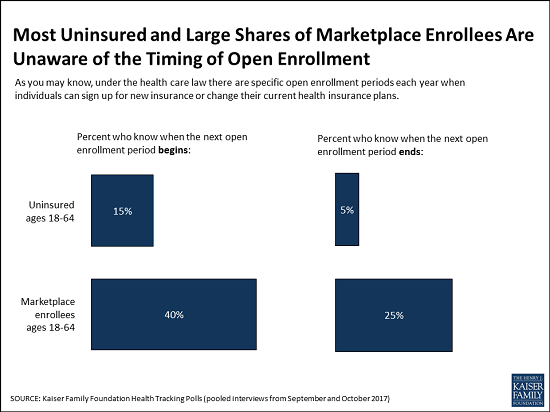|
Just Released
|
|
|
As Senate Weighs Bipartisan Stabilization Bill with Cost-Sharing
Reduction Funding, Current Marketplace Enrollees Face Challenges with
Affordability
Knowledge and Awareness of Key
Facts Regarding Enrollment Is Low
As the Nov. 1 start of the Affordable Care Act’s open
enrollment period nears, new polling data
from the Kaiser Family Foundation
finds that most potential enrollees are unaware of when they can enroll and
have not seen any related advertisements.
Fielded
prior to yesterday’s announcement of a bipartisan marketplace stabilization
deal in the Senate that among other things would increase outreach funding,
the survey highlights key gaps in knowledge among people who are uninsured or
who are current marketplace enrollees.
One
in six (15%) people without health insurance and four in 10 (40%) marketplace
enrollees know that open enrollment begins on Nov. 1 this year. Even fewer
(5% of the uninsured, 25% of marketplace enrollees) are aware of the month
when open enrollment ends in their state.
The poll finds that few of those most likely to
consider marketplace coverage report hearing or seeing any ads providing
information about how to get insurance under the health care law. Small
shares of the uninsured (19%) and marketplace enrollees (12%) say they saw
ads in the past 30 days that provided information about how to get insurance.
Slightly
more than half (54%) of the uninsured say they plan to get health insurance
in the next few months, while four in 10 (43%) expect to remain uninsured
despite the individual mandate.
Most
marketplace enrollees satisfied with their plans but worry about costs
While
Congress weighs legislative changes to stabilize the marketplaces, the new
survey also provides a snapshot of the experiences of current marketplace
enrollees. Despite reports of plans dropping out of the marketplaces, most
(70%) report being satisfied with their insurance choices. However, nearly
four in 10 (36%) say they are worried that their current insurance company
will stop selling plans in their area.
At
a time when funding for cost-sharing reduction payments hangs in the balance
in Congress, significant shares of marketplace enrollees report struggling
with and worrying about affordability issues. For example:
Marketplace
enrollees’ concerns about cost and availability in many ways are similar to
those of people with employer coverage. For example, about half (49%) of
those with employer coverage report that their deductibles and co-pays have
been going up lately. Similarly, half (51%) say their premiums have been
going up, including a quarter (25%) who say they have gone up a lot.
The
poll also finds most of the public (71%), including most marketplace
enrollees (79%), are aware that the Affordable Care Act’s individual mandate
that requires most people to obtain health coverage or pay a fine remains in
effect. Among the uninsured, a smaller majority (59%) are aware the mandate
is in effect, though one in five (18%) believe it is not and one in four
(23%) are unsure.
The
vast majority (85%) of marketplace enrollees also say they plan to sign up
for health insurance during the 2018 open enrollment period, and most of them
(54% of the total marketplace enrolllees) prefer to renew their current plan
if it is available next year.
Among
marketplace enrollees, one in four (26%) say the law’s requirement for them
to have health insurance or else pay a fine is a “major reason” they chose to
purchase coverage. However, most (55%) say it was “not a reason,” and the
vast majority (90%) say they would continue to buy their own insurance even
if the government stopped enforcing this requirement.
METHODOLOGY
Designed
and analyzed by public opinion researchers at the Kaiser Family Foundation,
the poll was conducted by telephone from Sept. 13 - 24 and Oct. 5 - 10, 2017
among a random sample of 2,505 adult U.S. residents, including an oversample
of respondents who purchase their own insurance (non-group enrollees).
Interviews were conducted in English and Spanish by landline (867) and cell
phone (1,638). The margin of sampling error is plus or minus 2 percentage
points for the full sample, plus or minus 9 percentage points for marketplace
enrollees (n=195), plus or minus 7 percentage points for the uninsured ages
18-64 (n=206), and plus or minus 4 percentage points for those ages 18-64
with employer coverage (n=935). For results based on other subgroups, the
margin of sampling error may be higher.
Filling
the need for trusted information on national health issues, the
Kaiser Family Foundation is a nonprofit organization based in Menlo Park,
California.
|
|
To be a Medicare Agent's source of information on topics affecting the agent and their business, and most importantly, their clientele, is the intention of this site. Sourced from various means rooted in the health insurance industry - insurance carriers, governmental agencies, and industry news agencies, this is aimed as a resource of varying viewpoints to spark critical thought and discussion. We welcome your contributions.
Wednesday, October 18, 2017
As Senate Weighs Bipartisan Stabilization Bill with Cost-Sharing Reduction Funding, Current Marketplace Enrollees Face Challenges with Affordability
Subscribe to:
Post Comments (Atom)


No comments:
Post a Comment